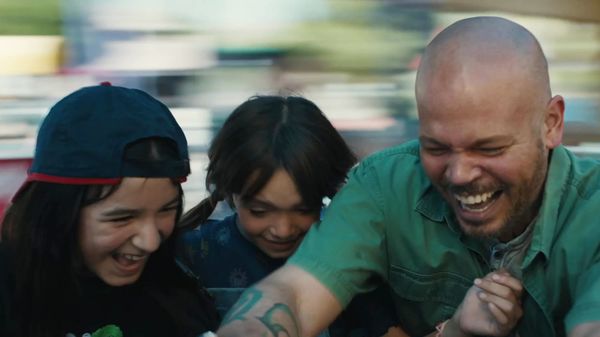Eye For Film >> Movies >> In The Summers (2024) Film Review
In The Summers
Reviewed by: Jeremy Mathews

There are small details that come to define relationships. Fleeting moments can become lingering memories that somehow encapsulate how you feel about a person, or how you think they feel about you. Alessandra Lacorazza’s In The Summers is a carefully observed, quiet film that lets you live in those moments and understand how its characters relate to each other on their own terms.
The movie depicts the strained relationship between a father and his two daughters, Violeta and Eva, who only see him during summer visits to the house his mother left him. With five sets of actors as the kids, it tracks the trips to Las Cruces, New Mexico, and observes the commonality, differences and failures of everyone involved.

Written and directed by Lacorazza, the film won the US Dramatic Grand Jury Prize at the Sundance Film Festival thanks to great performances and a supremely confident sense of story. Lacorazza avoids laborious exposition to fill in the missing time gaps, resists the temptation to focus the narrative on a trans coming-out and shows a rare gift for understanding what actually matters. To say the exposition is subtle is an understatement – it feels more like there’s none at all. The characters speak naturally about the things in their life, and the film trusts us to piece together the essential information.
That’s not to suggest the movie is nothing but quiet moments. There are bust-ups, plus harrowing and even frightening sequences. But they always feel organic to the story, and the build up and aftermath carry equal importance. This is, ultimately, a study in relationship dynamics.
René Pérez Joglar, also known as Puerto Rican rapper Residente of duo Calle 13, plays the father, Vicente, and serves as the film’s throughline while the child actors change from year to year. In his first acting job, Joglar builds a strong case for empathy towards his sadly flawed character. No doubt aided by Lacorazza’s keen eye for detail, he also communicates a strong evolution over the years, as Vicente prepares to welcome his daughters with nervous unease in the early years and becomes more blasé and careless as his alcoholism worsens, and in later years carries guilt for his failure as a father.
It’s a bit dangerous to cast a new set of child actors in each segment, as it risks making the film feel patchy and inconsistent, but the actors slide into their roles so well that there’s no sense of relearning the characters, other than discovering how they’ve changed. The decision also avoids awkward moments in which the actors try to play older or younger.
Lacorazza also nails the sense of place people have in a town they visit regularly, but never live. Cinematographer Alejandro Mejía’s precise compositions help make the locations memorable so that we recognise the changes in both setting and character.
Emma Ramos is tough yet understanding as Vicente’s bartender friend Carmen, who serves him beer while he shoots pool, and, with limited success, tries to moderate his consumption as the night goes on. As a lesbian, she also serves as a friend and emotional support to Violeta as she recognises her trans identity.
When the sum of all the film’s parts begins to combine into a whole, the result is staggering. We see how a failure to properly express appreciation can stop people from recognising genuine love, as evidenced by a handmade ashtray. We see how addiction can be passed on. We see how late-life rehabilitation can feel like a slap in the face to the people you hurt in the past. And ultimately, we see how we’re never really done dealing with the small moments that define us.
Reviewed on: 09 Mar 2024














